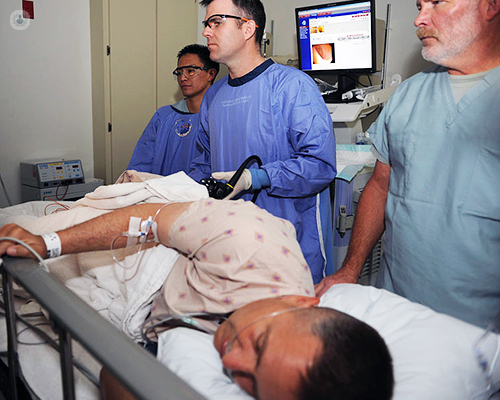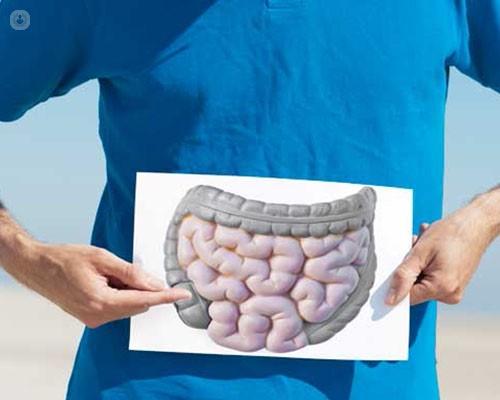What does a colonoscopy procedure involve and why and how is it performed?
Written by:Bowel-related disorders and symptoms are common and may be caused by something simple such as an infection or a stomach bug. Persistent symptoms, however, can be caused by something more serious. If you have persistent symptoms, it is important to seek medical advice and possibly have further investigations carried out.
In our latest article, we quizzed vastly experienced consultant colorectal surgeon, Mr Rajeev Peravali on what a typical colonoscopy procedure entails as well as the various reasons for undergoing it.

What is a colonoscopy?
A colonoscopy is a camera examination of the rectum and the colon. Essentially, what occurs is that the patient will have bowel prep at home, which cleans the bowels out and then they will attend hospital.
Most people choose to have sedation because a colonoscopy can be uncomfortable. Once the sedation is administered, the camera is then inserted through the anus in order to examine both the rectum and the colon. The idea is to look for abnormalities such as inflammation, diverticular disease, polyps or cancer.
What are the main reasons for having a colonoscopy?
There are several reasons why one might have a colonoscopy.
- The primary reason is an unexplained change in bowel habit. This may be either constipation or diarrhoea.
- bleeding from the back passage
- anaemia, which is a drop in your haemoglobin levels
- Abnormal CT scan. An abnormal CT scan would indicate that an abnormality has already been found and we need to investigate further. Often, the CT scan is performed for some other unrelated issue.
- Other reasons for undergoing a colonoscopy procedure include surveillance of conditions that a patient may have had previously, such as inflammatory bowel disease or cancer of the bowel or rectum.
What are some possible colonoscopy alternatives?
There are two main alternatives to colonoscopy. The first one is CT colonoscopy, which is the so-called virtual colonoscopy. Essentially, this is a CT scan that looks specifically at the colon.
A CT colonoscopy is quite effective at picking up significant problems, such as polyps or cancers, as well as smaller issues such as inflammation. The main disadvantage, however, of a virtual colonoscopy is that we cannot take biopsies.
The other alternative to a standard colonoscopy procedure is a FIT test, which, essentially, is a stool test which is sent to the laboratory. A FIT test is very effective at detecting cancer, but is not so good at detecting other problems within the bowel.
Again, we are unable to know for sure what is happening within the bowel. A positive FIT test will require the patient to undergo a colonoscopy.

How has COVID-19 impacted colorectal screening?
Whilst urgent colonoscopies are still happening in a timely manner within the NHS, those that are deemed not urgent are taking much, much longer.
Is a colonoscopy test the most reliable one of its kind for detecting bowel conditions?
The best, most effective test to investigate the rectum and the colon, without a doubt, is a colonoscopy. It is the goal-standard investigation where we can directly look at the bowel and take biopsies if needed.
Mr Rajeev Peravali is a highly esteemed colorectal surgeon who specialises in bowel cancer. If you have any bowel-related medical concerns, check out his Top Doctor’s profile to book a consultation with him.


